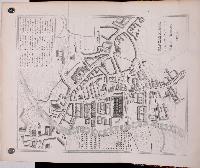
The history of the University of Cambridge Map

about 1437 - before Oct 1481
about 1437 |
Born in Coventry & Lichfield diocese |
15th Mar 1459 |
Educated Admitted to Cambridge University |
22nd Dec 1459 |
Religion Tonsured and Ordained Acolite |
5th Apr 1463 |
Educated Admitted to Batchelor of Theology |
between 1469 and 1470 |
Educated Bachelor of Divinity |
between 1469 and 1470 |
Misc in Rector / Proctor of the University of Cambridge.1 |
after 11th Mar 1473 |
Religion Warden of chantry in St. John Baptist chapel next St. Mary Aldermary, London |
18th Oct 1474 |
Religion Admitted as Vicar of Stoke Poges, Buckinghamshire |
1477 |
Religion Admitted as Rector of St. Michael, Horton, Buckinghamshire / Berkshire |
Apr 1478 |
Religion Vacating Vicar of Stoke Poges, Buckinghamshire |
Oct 1478 |
Religion Vacating Rector of St. Michael, Horton, Buckinghamshire / Berkshire |
before Oct 1481 |
Died |
Page created using GEDmill 1.11.0